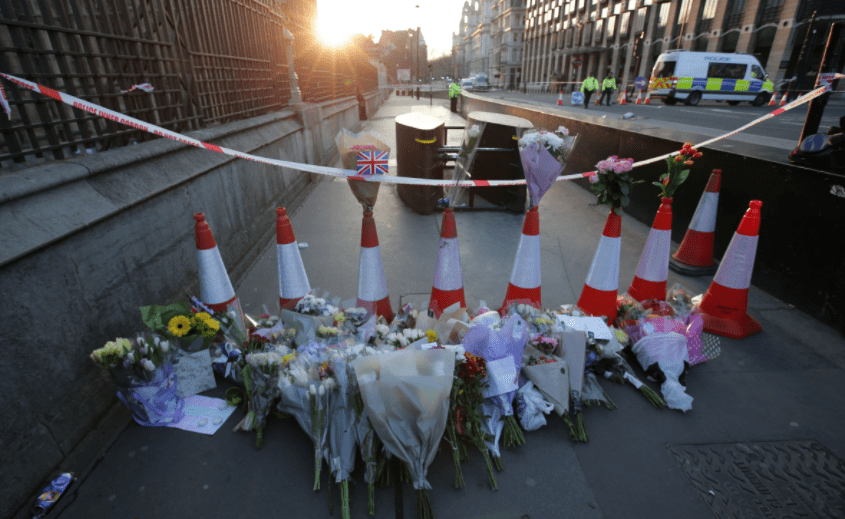The hashtag ‘PrayForLondon’ is trending on social media. But so is ‘Antwerp’. Because no sooner were we invited to pray for London than a man of ‘North African descent’ was narrowly prevented from doing something similar in the Belgian city. This is life as usual in Europe now, of course. But among the endless replays to date – and the endless replays yet to come – there are several things worth noting about Wednesday’s attack in London.
The first is that the perpetrator – now identified as one Khalid Masood – was in one sense unusual. A recent comprehensive analysis published by my colleague Hannah Stuart found that among Islamist-related offences in the UK the most common age of the offender was 22. So at 52 years old Khalid Masood was some decades older than the average attacker. Although this is wholly speculative, that is a possible reason why he avoided being regarded as an imminent threat by MI5. There has only been one other individual in the UK who has sought to participate in remotely similar acts at Masood’s age.
The second thing worth noting is that by the jihadists’ own lights Masood’s attack was an expression of failure. It demonstrated once again that people inspired by Isis in the UK aren’t able to get hold of the kind of munitions they would like. Put another way, the fact that Wednesday’s attacker used a car and a knife is not a demonstration of operational strength.
After more than a decade of bomb plots successfully thwarted by our police and security services, the mass casualty bomb attack remains out of reach for Isis supporters in Britain. Likewise, although Isis recruits have been able to attack Paris with Kalashnikov rifles, a mix of geographical good luck and hard work by the authorities has meant Isis supporters have not been able to acquire such arms in the UK. Had they been, then Westminster would have been the scene of even greater carnage on Wednesday. This is not entirely good news, of course. For as in Israel in recent years, while vehicle and knife attacks show that the terrorists can’t get hold of anything else, the downside is that anyone can get hold of such weapons and there is not very much that the authorities can do to stop them.
Another thing worth noting is the way in which the Prime Minister and other figures in authority have responded to this attack. On one level they are wholly right to stress that such attacks will not change anything about our way of life. ‘You will not defeat us. Our values will prevail’ was Theresa May’s admirable message. And yet such statements can sound like over-protestation. Many people will have thought, ‘Well of course a single man armed with a knife and a car will not change our way of life. Nobody – except perhaps for the attacker and some of his fanboys on social media – could seriously have thought otherwise.’
It is true that on social media various supporters of Isis are boasting that ‘A single Muslim put all of Britain into a state of alert and stopped traffic in London, even though they killed him, may Allah accept him [as a martyr].’
But London got back to normal fairly quickly and before long this attack will have merged into the back of the city’s memory, like so many attacks before. These are specifics, and they change slightly with each attack in each Western city. But underneath them all the usual fault-lines exist.
Personally I don’t think that the immediate aftermath of such an attack is the ideal moment for the Prime Minister to begin talking about Islam. But what is this ‘international terrorism’ about which everyone is now talking? The phrase is designed to obscure. Where does it come from, this ‘international terror’? Might anyone suffer from it? I happened to be in Hungary on the day Westminster was attacked. Hungary does not appear to suffer from this ‘international terrorism’ in the way that France and Britain do. Is there any reason for that?
Of course the fact that the authorities always seem to know where to go after such attacks inadvertently assists the public in making up our own minds. Who could have been remotely surprised that immediately after the Westminster attack there were police operations in Birmingham? Yet no one dares to extrapolate out from this. The nearest most of our political leaders can manage is a type of resigned fatalism. These things are like the weather – or the ever-increasing levels of airport security.
Last July, after the truck attack in Nice, the French Prime Minister Manuel Valls declared that France ‘must learn to live with terrorism’. He was fairly heavily criticised for saying this. As was the present Mayor of London, Sadiq Khan, when he said last September that terror attacks these days are just ‘part and parcel of living in a big city’. In a sense Khan and Valls are correct. Terror is indeed something that the residents of London, Paris, Antwerp and many other cities are going to have to learn to live with. In the same way that the residents of Istanbul, Beirut and Islamabad have had to learn to live with the same.
Yet why it might be that London, Paris and Antwerp are having to accustom themselves to the security status of Istanbul, Beirut and Islamabad is a question that nobody in any position of power seems keen to ask.







Comments